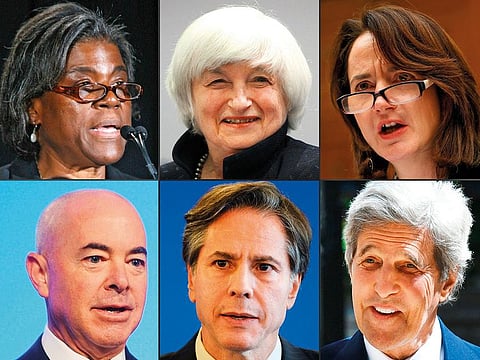Biden cabinet signals return of experience
President-elect has turned to the past to build the new future for the US

Three weeks after Americans cast their ballots in a general election, the transition to a new administration is fully underway — a change underlined by President-elect Joe Biden appointing senior names to his new cabinet and administration.
The appointments demonstrate Biden’s long service in Washington and acknowledge and reward some of his closest long-term advisers and experienced confidants. In looking to the future course for America for the next four years, Biden has looked to the past, with a number of familiar faces returned to the top levels and offices of state.
Janet Yellen, a long-serving chair of the Federal Reserve returns to the insiders fold in Washington, taking over Treasury with responsibilities to finance and set fiscal policy for a nation sideswiped by the economic hibernation brought by coronavirus.
The selection of Antony Blinken shows the incoming administration is intent in resetting and restoring Washington’s close ties with the North Atlantic Treaty Organisation, the European Union and the traditional allies of the US. Multilateralism and internationalism are again on the table for the new administrationGulf News
John Kerry, a former presidential candidate and Secretary of State with decades of experience on the floor of the US Senate, has been appointed Biden’s envoy on climate change — a clear signal that the new administration is placing environmental action high on its agenda.
Multicultural nature of US society
Biden too has turned to the former second-in-charge at the Central Intelligence Agency, Avril Haines, to take the reins at the National Intelligence Agency. Across the board, Biden’s nominations reflect both the multicultural nature of US society and the rich vein of experienced personnel that he worked with in his years at the Senate and as vice president to Barack Obama.
The president-elect has also turned to an experienced diplomat, security adviser and internationalist as his nomination for US Secretary of State. The selection of Antony Blinken shows the incoming administration is intent in resetting and restoring Washington’s close ties with the North Atlantic Treaty Organisation, the European Union and the traditional allies of the US. Multilateralism and internationalism are again on the table for the new administration.
In rolling out his national security team choices, including top posts for state department and department of homeland security, President-elect Biden said the nominees show “experience and leadership, fresh thinking and perspective and an unrelenting belief in the promise of America”.
All of the appointments will need to be approved by the US Senate, a process that President-elect Biden hoped would not take time. As things stand now, Republicans hold a two-seat advantage in the 100-seat chamber, though two Georgia seats will be filled in run-off elections in early January. Should the Democrats claim both, incoming Vice President Kamala Harris will hold the deciding vote.



